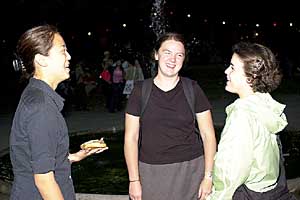Fourth-year survey shows early search gets the job
By Josh SchonwaldNews Office
 Fourth-years Anne Shiu, Dawn LaValle and Amy DeCelles gather at this year’s fourth-year barbeque. | |
Should I apply for jobs in the fall, or can I wait until the spring? Who should I ask for a recommendation? Are job fairs useful?
Students entering their fourth year in the College often are anxious and brimming with questions about post-College life. For the second consecutive year, their predecessors are offering them some pre-graduation guidance.
The cornerstone of the second annual Kick-off Barbecue for fourth-years was the data presented from a voluntary survey conducted in May, which asked important questions about the post-Chicago plans of students in the Class of 2004. On Monday, Sept. 27, in Mandel Hall, the Class of 2005 heard the results as well as valuable advice from alumni, administrators and faculty.
“If you start searching for a job late,” said Bill Michel, Assistant Vice President for Student Life and Associate Dean of the College, “you’ll likely graduate without a job.” Of the students who graduated last year without a job, more than 70 percent had waited until Spring Quarter to begin their job search.
The survey also revealed that finding a job took between four and nine months. For some students, the message was well timed. Horacio Chavez, a fourth-year Latin American Studies concentrator, was planning on starting his job search in Winter Quarter but said, “I may begin a little earlier.”
Survey results were released on the first day of classes to help fourth-years make informed decisions about how to best take advantage of their final year, said Liz Michaels, Director of Career Advising and Planning Services (formerly known as Career and Placement Services). “We can’t give them a job, we can’t get them into graduate school,” said Michaels, “but we can provide them with all the resources and support they need.”
While much of this year’s message to students was similar to last year, CAPS took a new approach to reinforce the data findings and respond to students’ needs. After John Boyer, Dean of the College, gave a presentation, three additional speakers addressed the fourth-years, including two alumni.
Will Burns (A.B.,’95, M.A.,’98) told students, “It’s OK not to know what you want to do.” Burns, who thought little about post-collegiate plans, landed a job through a Chicago friend at the Blue Gargoyle Youth Services Center, which ultimately led to discovering his passion—public service.
A former vice president of the Urban League of Chicago and current Senior Advisor to Illinois State Senate Majority Leader Emil Jones, Burns emphasized the value of networking and College resources.
“Not every Chicago alumni member is in investment banking or consulting. There are alumni in so many different careers, not-for-profits, government, teaching,” Burns said. “Use the University network.”
Burns’ message echoed the survey finding that showed personal connections, campus contacts and contacts through internships were the most effective job-searching techniques for students who successfully found full-time jobs.
Jennifer Costello Fortner (A.B.,’98), who is now a vice president at Goldman Sachs, offered some nuts-and-bolts tips for these first-time job hunters on everything from learning to allocate job search time as if it were a scheduled class to the necessary practice of talking about oneself.
“A lot of Chicago students are great at talking about technical issues in finance,” said Fortner, who has worked for several years as a recruiter, “but when it comes to answering the softball question, ‘what can you tell me about yourself?’ they struggle. You need to practice telling your story. Think about it. Rehearse it.”
The survey also revealed that 21 percent of last year’s graduates immediately enrolled in graduate or professional schools, and that more than four out of five College graduates plan to pursue graduate or professional degrees.
Danielle Allen, Dean of the Division of the Humanities and Professor in Classical Languages & Literatures and the College, gave the final presentation, providing a faculty perspective. Allen, who explained how students planning to attend graduate school could prepare for that transition, urged them to take the initiative when seeking faculty advice and recommendations.
“Consult and converse with them,” said Allen. “Ask them about your suitability for graduate school.” She also encouraged students to get recommendations early, while students remain fresh in the minds of faculty members.
Michel concluded the event by demonstrating valuable services available to College students. Chicago’s online Alumni Careers Network offers students point-and-click access to a database of more than 7,000 alumni. Also, the new Chicago Student Network provides undergraduates with access to data about their peers.
The new Web-based networks—which connect students to 150,000 students and alumni—again reinforce an important finding of the data. “Some of your best job-seeking resources are your peers,” added Michel.
![[Chronicle]](/images/sidebar_header_oct06.gif)